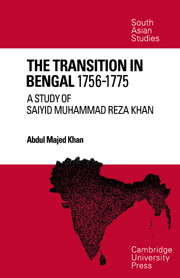Book contents
- Frontmatter
- Contents
- Map of the Mughal Subah of Bengal, Bihar and Orissa in the eighteenth century
- Preface
- List of Company servants with their Mughal titles
- List of abbreviations
- 1 Introduction: the twilight of Mughal Bengal
- 2 The early life of Reza Khan and his first public office in 1756
- 3 The involvement in politics, 1760–1763
- 4 The Naibat at Dacca, 1763–1765
- 5 The Naibat Subahdari at Murshidabad, 1765
- 6 Reza Khan at the zenith of his power, 1765–1767
- 7 The early reverses, 1767–1768
- 8 Conflict of interests: opposition to trade monopolies and proposal for supervisorships, 1769
- 9 The conflict deepens, 1769–1770
- 10 The rearguard action and Reza Khan's arrest, 1770–1772
- 11 The ‘Inquisition’, 1772–1775
- Select bibliography
- Index
- Plate section
9 - The conflict deepens, 1769–1770
Published online by Cambridge University Press: 29 October 2009
- Frontmatter
- Contents
- Map of the Mughal Subah of Bengal, Bihar and Orissa in the eighteenth century
- Preface
- List of Company servants with their Mughal titles
- List of abbreviations
- 1 Introduction: the twilight of Mughal Bengal
- 2 The early life of Reza Khan and his first public office in 1756
- 3 The involvement in politics, 1760–1763
- 4 The Naibat at Dacca, 1763–1765
- 5 The Naibat Subahdari at Murshidabad, 1765
- 6 Reza Khan at the zenith of his power, 1765–1767
- 7 The early reverses, 1767–1768
- 8 Conflict of interests: opposition to trade monopolies and proposal for supervisorships, 1769
- 9 The conflict deepens, 1769–1770
- 10 The rearguard action and Reza Khan's arrest, 1770–1772
- 11 The ‘Inquisition’, 1772–1775
- Select bibliography
- Index
- Plate section
Summary
With Verelst's departure from Bengal in December 1769, Reza Khan had entered a long and bitter struggle for survival. In this he had received much assistance from Richard Becher, whose interest as Resident until the close of 1770 had become linked with his. The difficulties had been made easier to bear by the warmth and sympathy of John Cartier, an old friend of the Dacca days, who had succeeded Verelst as governor. But the times were difficult even for Cartier. Verelst's parting letter of advice, submitted to the Council on 16 December 1769, was a catalogue of problems bequeathed to his successor. These problems did not diminish in 1770, but grew in number and complexity. Bengal was in the grip of a still mounting famine and of an epidemic of smallpox which was soon to claim the Nawab Nazim as one of its many victims. The difficult task of introducing the scheme of supervisorships, put off by Verelst, had soon to be tackled. In London events were moving towards a revolution in the Directorate and a crisis in the Company's relations with the state. Already three Commissioners for India had been appointed to come out with extraordinary powers, and the news of their appointment weakened Cartier's authority. In Bengal the group conflicts within and without the Council were still unresolved and still acrimonious. They were soon to develop into an open battle between the Committee and the Council for control over the revenue administration.
- Type
- Chapter
- Information
- The Transition in Bengal, 1756–75A Study of Saiyid Muhammad Reza Khan, pp. 216 - 263Publisher: Cambridge University PressPrint publication year: 1969



